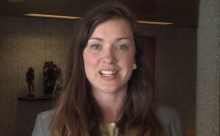PSI Executive Board: the members talk

Veronika Karlsson, President of VISION, Sweden, says, “Unions need to be relevant for all workers during all their working lives, from young workers to those nearing retirement.”
Tomio Ishihara, JPSU, Japan, explains that in Japan, public employees’ basic worker rights, including the right to collective bargaining, are restricted. JPSU is running a campaign for workers’ rights, appealing to the ILO and lobbying the Japanese government.
Adeniyi Peters Adeyemi, Non-Academic Staff Union of Education and Associated Institutions (NASU), Nigeria, speaks about privatisation, reforms and Ebola. He explains how Nigerian people have suffered under privatisation, and how in view of the consequences of privatisation, they are now joining in the unions’ opposition and asking the government to fix the problems. He also explains how Nigeria achieved good results in tackling the Ebola crisis.
Omar Autón, Unión del Personal Civil de la Nación (UPCN), Argentina, describes the situation in Latin America. Unions are fighting for trade union rights, the right to strike, unionization, collective bargaining, and to obtain quality public services. The video is in Spanish.
Isolde Kunkel-Weber, Ver.di, Germany, says that her union is confronting cuts to public services. But even when services are privatised, the union makes its voice heard and demonstrates how important public services are for society. Ver.di is actively campaigning to demonstrate that kindergarten workers’ jobs need to be revalued in terms of status and salary, highlighting the importance of their role in caring for and educating children. The video is in German.
Juneia Batista, WOC Chair, talks about the situation in her home country, Brazil. She says that 2015 has started poorly, with the government introducing new measures to allow foreign capital into the Brazilian health system. The government introduced a new form of Public-Private Partnership (PPP) allowing private hospitals to manage existing public hospitals, using public funds. However, the situation did not improve for workers nor for patients. The government has recently announced new cuts that will affect services in health, education and housing. The government needs to urgently reform the tax system, says Juneia. The rich are getting richer while the workers continue to suffer from the financial crisis of 2008. The video is in Brazilian Portuguese.

